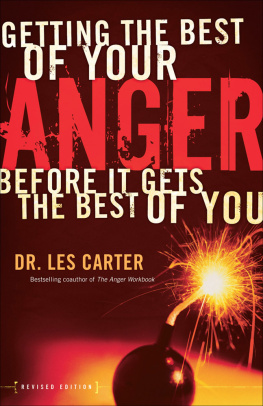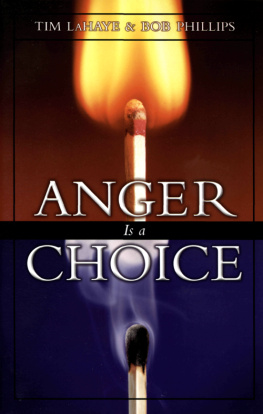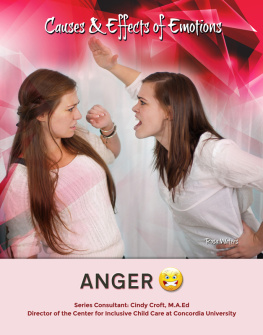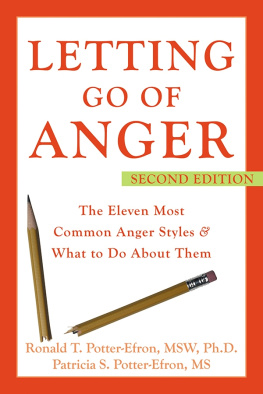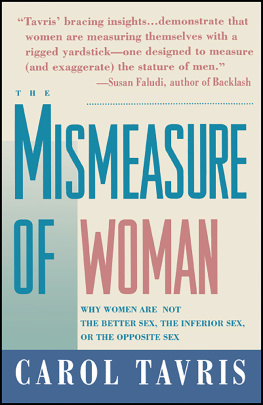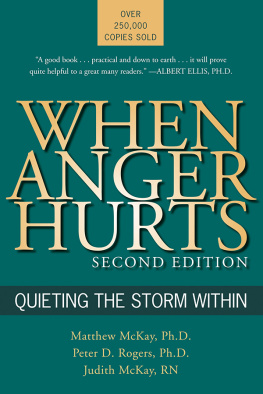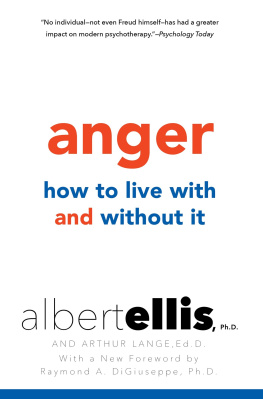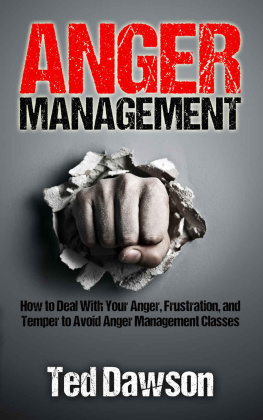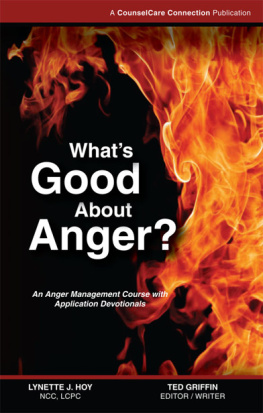Dr. Les Carter - Getting the Best of Your Anger: Before It Gets the Best of You
Here you can read online Dr. Les Carter - Getting the Best of Your Anger: Before It Gets the Best of You full text of the book (entire story) in english for free. Download pdf and epub, get meaning, cover and reviews about this ebook. year: 2007, publisher: Baker Publishing Group, genre: Religion. Description of the work, (preface) as well as reviews are available. Best literature library LitArk.com created for fans of good reading and offers a wide selection of genres:
Romance novel
Science fiction
Adventure
Detective
Science
History
Home and family
Prose
Art
Politics
Computer
Non-fiction
Religion
Business
Children
Humor
Choose a favorite category and find really read worthwhile books. Enjoy immersion in the world of imagination, feel the emotions of the characters or learn something new for yourself, make an fascinating discovery.
- Book:Getting the Best of Your Anger: Before It Gets the Best of You
- Author:
- Publisher:Baker Publishing Group
- Genre:
- Year:2007
- Rating:5 / 5
- Favourites:Add to favourites
- Your mark:
- 100
- 1
- 2
- 3
- 4
- 5
Getting the Best of Your Anger: Before It Gets the Best of You: summary, description and annotation
We offer to read an annotation, description, summary or preface (depends on what the author of the book "Getting the Best of Your Anger: Before It Gets the Best of You" wrote himself). If you haven't found the necessary information about the book — write in the comments, we will try to find it.
Dr. Les Carter: author's other books
Who wrote Getting the Best of Your Anger: Before It Gets the Best of You? Find out the surname, the name of the author of the book and a list of all author's works by series.
Getting the Best of Your Anger: Before It Gets the Best of You — read online for free the complete book (whole text) full work
Below is the text of the book, divided by pages. System saving the place of the last page read, allows you to conveniently read the book "Getting the Best of Your Anger: Before It Gets the Best of You" online for free, without having to search again every time where you left off. Put a bookmark, and you can go to the page where you finished reading at any time.
Font size:
Interval:
Bookmark:


1983, 2007 by Les Carter
Published by Revell
a division of Baker Publishing Group
P.O. Box 6287, Grand Rapids, MI 49516-6287
www.revellbooks.com
Ebook edition created 2013
All rights reserved. No part of this publication may be reproduced, stored in a retrieval system, or transmitted in any form or by any meansfor example, electronic, photocopy, recordingwithout the prior written permission of the publisher. The only exception is brief quotations in printed reviews.
ISBN 978-1-4412-3467-4
Library of Congress Cataloging-in-Publication Data is on file at the Library of Congress, Washington, DC.
Unless otherwise indicated, Scripture quotations are from the New American Standard Bible, Copyright 1960, 1962, 1963, 1968, 1971, 1972, 1973, 1975, 1977, 1995 by The Lockman Foundation. Used by permission.
Scripture marked RSV is taken from the Revised Standard Version of the Bible, copyright 1952 [2nd edition, 1971] by the Division of Christian Education of the National Council of the Churches of Christ in the United States of America. Used by permission. All rights reserved.
Foreword
D R. L ES C ARTER has done it again. Dr. Carter has analyzed the two primary sources of emotional pain in his first two books. In Why Be Lonely? , he thoroughly addressed solutions to the pain of loneliness. In this book, Dr. Carter has dealt with the primary cause of most of our emotional pain: improper handling of the emotion of anger. As a psychiatrist I fully believe that the improper handling of anger causes about 95 percent of psychological depressions. I also am convinced that fear of becoming aware of the anger we hold within ourselves is a primary cause of anxiety.
In this book Dr. Carter has done a better job of describing the causes and dynamics of anger-related emotional pain than has the author of any book or article I have ever read on the subject. His recommendations for getting anger under control are biblically accurate and psychologically sound. Christians and non-Christians alike will benefit by reading and applying the sound advice in this book. Christians in particular will benefit from this book because there has been so much unbiblical teaching within churches and seminars across America on the subject of handling anger. Well-intentioned Christian leaders have given damaging advice, which has resulted in thousands of unnecessary cases of clinical depression in America. With this book Dr. Carter shows that people can be both good and angry. Christ himself became very angry at times and yet was without sin. The Bible gives much advice on controlling that God-given emotion. This book is a must for every person who wants to minimize the emotional pain he will experience in this life.
Paul Meier
Paul Meier Clinic
Richardson, TX
Introduction
I WAS SITTING IN my den recently, reading through the newspaper, when I came upon the headline Hostility on the Highways. I assumed this would be one of those cute semi-psychological articles telling why people tailgate and blow their horns at each other. To my surprise it was a serious article that told how innocent people were taken from their cars and beaten by other motorists who had become impatient in traffic. It made me wonder what this world is coming to.
Over the years as I have been interviewed innumerable times about anger management, one subject that is repeatedly mentioned is road rage. Why do so many people struggle with this problem? I have concluded that in the relative anonymity of an automobile, people can reveal how strongly they struggle with feelings of insignificance, a dynamic that is at the very root of anger. Feeling like a nameless, faceless nobody in a sea of other nameless, faceless nobodies, we can be reminded how hungry we are to be affirmed and treated as worthy. Each time we are rudely invalidated by some pushy or insensitive driver, a mechanism inside is set off, prompting us to stand up for personal dignity. That is a noble thing. Unfortunately, many who take this stand do little to advance the cause for dignity, and in the end they communicate every bit as rudely as the ones they stand against.
I suppose we all have moments when we lose our cool. That is not unusual, nor is it always something that should generate great guilt and angst. It is not wrong to feel aggravated about being caught in snarled traffic. Neither is it necessarily wrong to know moments of frustration with friends, acquaintances, and family members who do not live up to expectations. Anger is a normal part of our humanity, and a person who denies ever feeling angry is not being honest.
But enough is enough.
There comes a time when anger can be very harmful. When it is allowed to flow uncontrolled, there is no limit to the destruction anger can cause. Every day I listen to people in my counseling office tell about the emotional hang-ups they have carried through the years. Virtually every person who has emotional problems can attest to times when anger was used inappropriately by significant people. The result is that as these people venture out into other relations, they know that anger is potentially destructive, yet they do not know what to do with it when they feel it.
Most people would agree that the preferred lifestyle is one in which contentment prevails. We readily state that we desire patience and understanding in our relations with each other. But when we least expect it or need it, something happens to foul things up. Someone speaks in a manner we despise. An unexpected event interrupts a tightly packed schedule. A friend promises to do a favor, then doesnt follow through. Someone reminds you of a past failure that was supposedly forgiven and forgotten. Before you know it, anger can break loose in a destructive expression.
Has this ever happened to you?
Do you know what it is like to have your emotional stability supplanted by anger?
Of course you do. Each of us at one time or another has let this emotion take over the personality in an ugly way. It is humbling to admit that we are not always in control of ourselves the way we would like to be.
Sadly, just one moment of ill-advised anger can spoil hours, months, or even years of living with good intentions. Anger can cause gaps to form in once-solid relationships. It has been instrumental in the breakup of marriages, families, friendships, and business associations. It can leave us struggling with lingering guilt and inferiority feelings. It is usually at the basis of depression and anxiety.
Each of us would benefit if we could learn to gain some mastery over the potentially disastrous emotion of anger. This does not mean that a person should get to the point of never feeling or expressing anger. That is neither humanly possible nor desirable. Anger per se is not wrong. It is the way we use and express it that can be labeled as right or wrong.
Think back to your earliest experiences of anger. Were you taught how to read the meaning beneath the emotion? Did you receive helpful tips about the options, both helpful and harmful, for expressing anger? More than likely, you received little, if any, coaching about the use of anger. In fact, your greatest lessons probably consisted of the modeling established by numerous influential individualsand in many cases that was not a good thing.
Because anger has been, and still is, managed regretfully, it is tempting to label it as purely negative. Yet when you learn to comprehend its deeper meaning, matching your presentation to the appropriate message that may be associated with it, you may find that it can be an ally rather than an enemy. Solid anger management can go a long way in clearing up conflict and misunderstanding.
Font size:
Interval:
Bookmark:
Similar books «Getting the Best of Your Anger: Before It Gets the Best of You»
Look at similar books to Getting the Best of Your Anger: Before It Gets the Best of You. We have selected literature similar in name and meaning in the hope of providing readers with more options to find new, interesting, not yet read works.
Discussion, reviews of the book Getting the Best of Your Anger: Before It Gets the Best of You and just readers' own opinions. Leave your comments, write what you think about the work, its meaning or the main characters. Specify what exactly you liked and what you didn't like, and why you think so.

